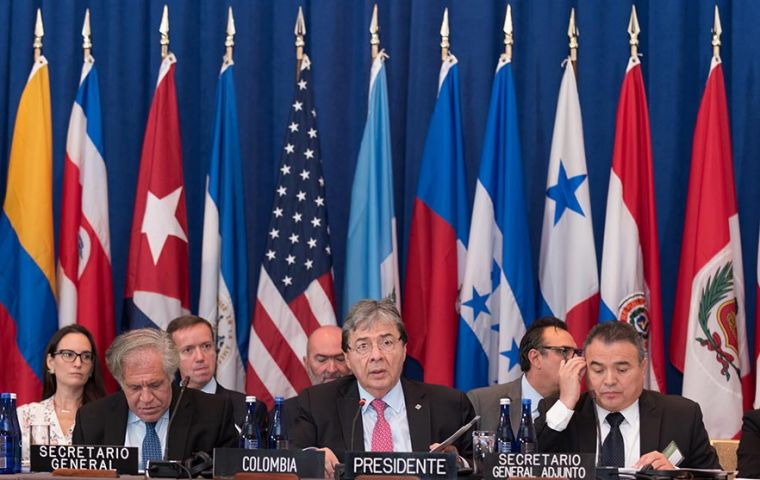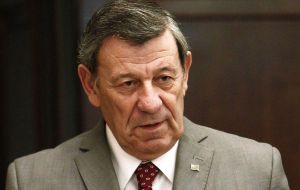MercoPress. South Atlantic News Agency
OAS votes to use Rio Treaty to implement economic sanctions to the Maduro regime, but no military action
 Although there were no immediate reactions from Caracas, in recent weeks Maduro and his aides have publicly denounced the Rio Treaty
Although there were no immediate reactions from Caracas, in recent weeks Maduro and his aides have publicly denounced the Rio Treaty  The approval of the resolution, follows the initial invocation last week of the Rio Treaty by opposition leader Juan Guaidó, the U.S. and 10 other countries.
The approval of the resolution, follows the initial invocation last week of the Rio Treaty by opposition leader Juan Guaidó, the U.S. and 10 other countries.  Uruguay foreign minister Nin Novoa had anticipated that if military action against Venezuela is agreed at OAS level, Uruguay will drop out from the Rio treaty”.
Uruguay foreign minister Nin Novoa had anticipated that if military action against Venezuela is agreed at OAS level, Uruguay will drop out from the Rio treaty”. In a meeting convened by the Organization of American States, 16 of the 19 states party to the Inter-American Treaty of Reciprocal Assistance, a 1947 pact known as the Rio Treaty, backed using the pact to collaborate on law-enforcement operations and economic sanctions against Venezuelan leader Nicolás Maduro, and associates, accusing his regime of criminal activity including drug trafficking and money laundering.
Only Uruguay opposed the resolution, while Trinidad and Tobago abstained and Cuba was absent at the extraordinary meeting held in New York. Uruguay has argued that the Rio Treaty is intended “for countries suffering armed aggression from foreign nations”, and this is not the case. “Uruguay will reflect in depth about this treaty”, and Foreign minister Rodolfo Nin Novoa had anticipated that if a military action against Venezuela is to be agreed at OAS level, Uruguay will drop out from the Rio treaty”.
Colombian Foreign Minister Carlos Holmes Trujillo, who chaired the session, touted the “immense majority” by which the resolution was approved, and said it marks the start of a broader effort to hold Maduro’s regime accountable.
Although there were no immediate reactions from Caracas, in recent weeks Maduro and his aides have publicly denounced the Rio Treaty, warning that the U.S. could use it to justify military intervention.
The approval of the resolution, on the sidelines of the United Nations General Assembly, follows the initial invocation last week of the Rio Treaty by Venezuelan opposition leader Juan Guaidó, the U.S. and 10 other countries.
The Rio Treaty was created as a means of mutual defense for Western Hemisphere countries and was last employed after the Sept. 11, 2001, terrorist attacks on the U.S.
US Secretary of State Mike Pompeo said last week that the invocation of the treaty signals an understanding that the situation in Venezuela threatens the security of the entire region and requires a collective response.
Many of the countries that are party to the treaty lack statutes by which they could impose sanctions on their own. The treaty provides those countries with a mechanism to sanction Maduro's regime, absent passing new laws internally.
The Rio Treaty vote followed a meeting earlier Monday by members of the Lima Group, composed of Latin American countries and Canada, which has called on Mr. Maduro to resign. Participants didn’t address potential military involvement, such as blockading Venezuelan ships or aircraft.
While some Rio Treaty signatories had called for the insertion of language explicitly ruling out military action, the U.S. resisted such a measure, with a senior State Department official on Monday calling it “superfluous.”
Signatories, whose foreign ministers met in New York, agreed to ask the OAS to continue monitoring the situation, and to reconvene within two months.
A senior European diplomat said that the EU will impose very soon targeted sanctions against members of Maduro’s regime, tied to the death in custody of naval captain Rafael Acosta Arévalo. Europe continues to consider broader sanctions if the situation further deteriorates.
The senior State Department official disputed contentions that the U.S. government has lost interest in Venezuela, saying the administration this week would “demonstrate through words, through meetings and through action” its commitment to the effort.
The official predicted that President Trump would address Venezuela during his General Assembly speech on Tuesday.




Top Comments
Disclaimer & comment rulesCommenting for this story is now closed.
If you have a Facebook account, become a fan and comment on our Facebook Page!